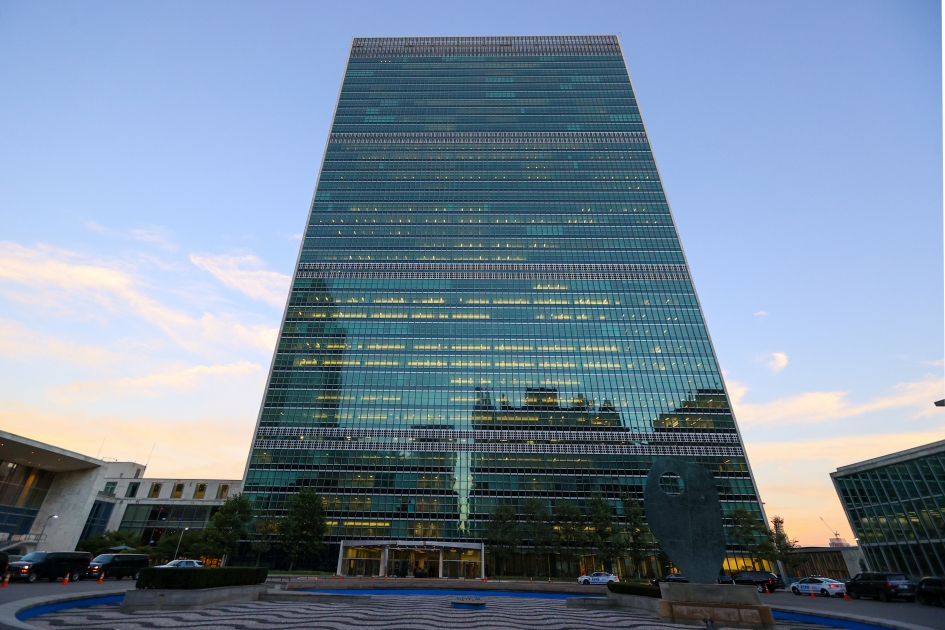Statement by Representative of the Russian Federation Mr.Andrey Belousov in the First Committee of the 76th session of the UN General Assembly at the Thematic Debate on “Regional Disarmament and Security”
Mr. Chair,
Colleagues,
Today the regional security is facing serious challenges in different parts of the world. Tensions are increasing, armed confrontation is rising, old conflicts are festering and new ones are emerging.
The normalization of situation in such zones of turbulence is possible through a direct dialogue of all parties involved on the basis of norms and principles of International Law and in accordance with objectives and goals of the United Nations. While solving regional problems it is unacceptable to resort to the threat or use of force, or to interfere into conflict settlement without UN Security Council approval. At the same time there is a strong demand for coordinated collective actions approved by the UN and relying on its authority.
One of the most important factors contributing to maintenance and strengthening of security on regional and subregional levels is conclusion of agreements on cessation of destabilizing military activities, arms control and disarmament.
Global trends towards the deterioration of the security situation have a negative impact on Europe as well. The root cause is the adoption by the United States and its NATO allies of a policy of confrontation with Russia, undermining the basis of European security and the arms control system.
The countries of the Alliance are building up their military capabilities along the Russian borders, increasing the speed of the transfer of forces to the Eastern flank. In response to the alleged Russian “threat”, multinational battalion tactical groups have been deployed in Latvia, Lithuania, Estonia, and Poland, a multinational brigade has been formed in Romania. Moreover, an armoured brigade and helicopter units of the U.S. Armed Forces have been transferred to the European territory. The total length of stay of ships of the NATO countries in the Black Sea waters during the year has increased.
The allies’ combat aviation has intensified the patrolling of the airspace of Bulgaria, Romania, and the Baltic States. Forward coordination centres and new division level HQs have been established in Eastern European countries to ensure rapid deployment and use of force groupings of the Alliance. Every year, at least 30 military and table-top exercises take place in close proximity to Russian borders. Reconnaissance activities near our borders involving ships, aircraft, and UAVs have intensified and are becoming increasingly dangerous.
At the same time, the United States and its allies have been destroying the fundamental arms control and confidence building agreements for years. In the early 2000s, Washington refused to ratify the Agreement on Adaptation of the Treaty on Conventional Armed Forces in Europe (CFE), thus undermining this pillar of European security. Moreover, the United States and its allies had been opposing the modernization of the Vienna Document on Confidence- and Security-Building Measures for a decade, while it was still possible. In recent years, Washington has adopted a course towards the destruction of the Treaty on Open Skies that led to its unilateral withdrawal under the fabricated pretext of alleged “Russian violations”. The result is obvious – the balance of rights, obligations, and interests of States Parties to the Treaty was broken, and Russia was forced to denounce it.
Even a brief objective overview makes it clear who is responsible for the current situation in European arms control. Appeals of our Western colleagues for "enhancing transparency" by modernizing the Vienna Document do not seem sincere. Their aim is to get even more insight into the activities of our Armed Forces. However, it should be clear to everyone that there will be no dialogue until NATO abandons its deterrence policy against Russia. From a broader perspective, no progress in conventional arms control in Europe can be expected with the current deficit of trust.
Does this mean that we have to sit idly and watch the situation deteriorate? Of course not. We believe that we must focus on implementation of existing agreements in good faith, including the Vienna Document. Additional voluntary transparency measures are useful, such as conducting briefings on exercises and unannounced down raids, posting detailed information about them on the official websites of defence agencies, inviting military attachés of foreign States to relevant events as observers. We suggest we agree on de-escalation measures, including the reduction in military activities along the border of Russia and NATO countries on a reciprocal basis, the improvement of mechanisms for the prevention of incidents and dangerous military activities.
We believe that the “Structured dialogue” on security challenges in the OSCE area, in particular on risk reduction and prevention of incidents, is an important confidence-building measure aimed at reducing military tensions. The discussion of these topics with the participation of diplomats and military experts contributes to a gradual creation of conditions necessary for future conversation on the key issues of European security and arms control.
Russia is ready for constructive work in the mentioned areas if our Western partners also follow the principles of equality, mutual respect, consideration of each other’s concerns and legitimate security interests. We have been consistently advocating for the settlement of regional security problems by politico-diplomatic means including through conclusion of on arms control and disarmament agreements.
Thank you.
